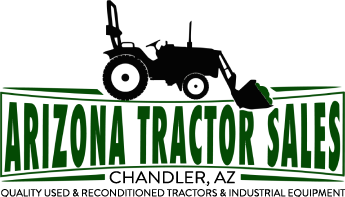Understanding Tractor Hours: How Many Hours are Too Many?
Understanding Tractor Hours: How Many Hours are Too Many?
Tractors are robust machines designed to handle demanding tasks over many years of service. However, like any mechanical equipment, they have a finite lifespan that can be measured in hours of operation. At Arizona Tractor Sales, we often encounter questions about tractor hours and their implications for maintenance and longevity. In this blog, we delve into the concept of tractor hours, how they impact your equipment, and what you should consider when evaluating a tractor's lifespan.
What Are Tractor Hours?
Tractor hours refer to the total number of hours a tractor has been in operation since it was first put to use. This includes time spent actively working in fields, hauling loads, using attachments, and idling. Tractor hours provide a quantitative measure of the machine’s usage and can influence its maintenance needs and overall durability.
Understanding Tractor Lifespan
The lifespan of a tractor can vary significantly based on factors such as:
Maintenance: Regular maintenance and servicing can extend the lifespan of a tractor by preventing premature wear and addressing potential issues before they escalate.
Operating Conditions: Tractors used in harsh environments or subjected to heavy loads may experience more rapid wear and require more frequent maintenance.
Quality of Construction: The build quality and materials used in manufacturing play a crucial role in determining how long a tractor can reliably operate.
Evaluating Tractor Hours
New vs. Used Tractors:
- New Tractors: A newer tractor (within the first 5,000 to 10,000 hours) generally requires less maintenance and may still be covered under warranty for major repairs. These tractors are designed to handle substantial hours before significant overhaul or replacement parts are needed.
- Used Tractors: Used tractors with higher hours may require more frequent maintenance and could be approaching the point where major components such as engines or transmissions may need rebuilding or replacement.
Maintenance History:
- A tractor with a well-documented maintenance history, including regular oil changes, fluid checks, and part replacements as per manufacturer recommendations, is likely to have a longer lifespan regardless of hours.
Type of Work:
- Tractors used for lighter duties or occasional tasks may accumulate fewer hours over time and therefore experience less wear compared to those used intensively for heavy agricultural or construction tasks.
Too Many Hours?
Determining whether a tractor has "too many" hours depends on several factors:
Condition: Evaluate the overall condition of the tractor. Signs of excessive wear, leaks, or mechanical issues may indicate that the tractor requires immediate attention, regardless of hours.
Maintenance Records: Reviewing maintenance records can provide insights into how well the tractor has been cared for and if it's likely to continue operating reliably.
Intended Use: Consider how you plan to use the tractor. A tractor with higher hours may still be suitable for light duties or occasional use even if it’s less suitable for heavy-duty tasks.
Conclusion
Tractor hours serve as a useful guideline for assessing a tractor’s usage and potential lifespan. While higher hours generally indicate more wear and potential maintenance needs, proper maintenance and care can significantly extend a tractor’s operational life. At Arizona Tractor Sales, we recommend consulting with our knowledgeable staff to discuss your specific needs and find the right tractor solution for your agricultural or construction operations.
For more information on tractor hours, maintenance tips, or to explore our wide selection of new and used tractors, visit our website or contact us today. We're here to help you make informed decisions and ensure your tractor investment serves you well for years to come.

